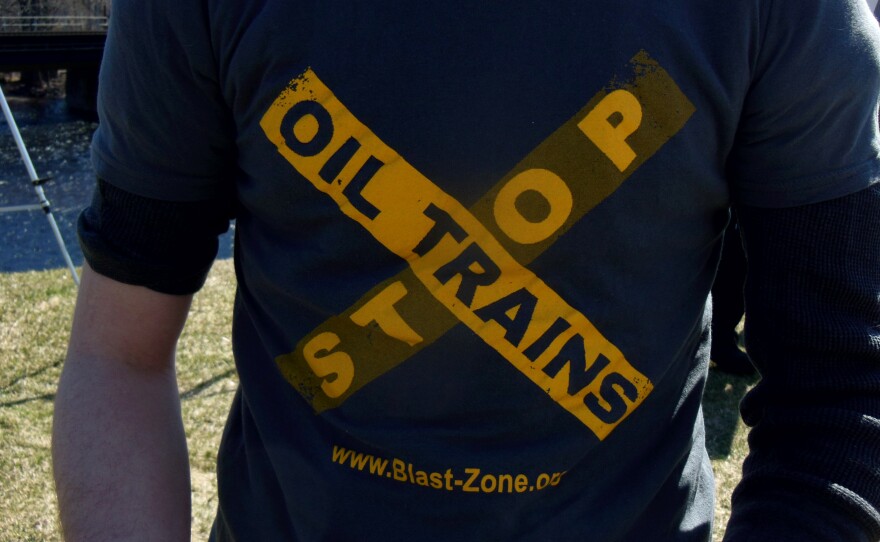A coalition of environmental and municipal officials stood in a park overlooking the Saranac River and a rail trestle this morning. They announced a new effort to convince federal representatives from New York and Vermont to ban crude oil transport in order to protect Lake Champlain and the Hudson River.
The group met at MacDonough Park across from City Hall. The park is only a few hundred yards from a rail trestle that daily sees trains carrying crude oil cross over the Saranac River as it empties into Lake Champlain. The advocates say transporting Bakken oil by rail remains an unacceptable risk to Vermont and New York, and is especially hazardous to the sensitive ecosystems of Lake Champlain and the Adirondacks.
More than 80 environmental, business, recreational and other organizations along with former members of state agencies, current and former state legislators and both the Plattsburgh and Burlington City Councils have signed a letter to the Vermont and New York Congressional delegation calling for a “federal legislatively imposed ban on the transport of oil along Lake Champlain and the Hudson River.”
National Wildlife Federation Senior Counsel Jim Murphy outlined a precipitous increase in rail accidents nationally over the past three years and says the oil trains that travel along Lake Champlain are too dangerous. “We have concluded that there is no safe way to transport this oil at this time. The trains that roll along this lake are sometimes twice the length of the train that destroyed Lac Megantic. The danger is just simply too high.”
Plattsburgh Ward One City Councilor Rachelle Armstrong called the oil trains travelling through the city an ominous problem. “Our municipalities need to stand up and become the advocates in a bold and aggressive way so that we bring the attention to bear on this issue that our leaders at the federal level need to recognize.”
The rail corridor along Lake Champlain also passes through the Adirondack Park. Adirondack Council spokesman John Sheehan says the trains pose a significant risk to the largest park in the contiguous United States. “This is also considered to be a biosphere reserve by the United Nations. The danger here is also to a drinking water supply for one hundred eighty thousand people. Lake Champlain serves as water for people from Vermont, New York and Quebec. So we have grave concerns about the environment, about communities and about wild lands here and we're hoping that the federal government takes them seriously.”
The trains carrying Bakken crude travel 100 miles along Lake Champlain and through the Adirondacks to the Port of Albany. Lake Champlain Committee Executive Director Lori Fisher believes a catastrophic accident is not a matter of if, but when. “In the past we have pushed for a ban on the DOT-111’s. That hasn't happened. There's been some movement to upgrade trains to the twelve thirty two's. They don't represent a greater safety for our communities. That's why we see the need to push for a ban on oil transport until it can be safe. We know it's not safe now and it's a ticking time bomb and we need to act now.”
The advocates noted that the evacuation zone from an oil train derailment in Plattsburgh includes City Hall, the downtown business area, the Country Government Center and numerous schools.








